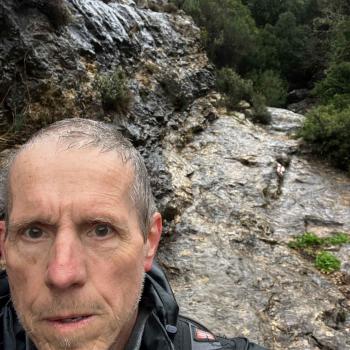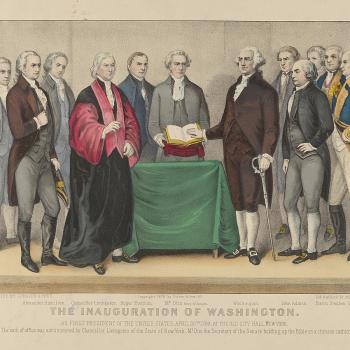Editors' Note: This article is part of the Patheos Public Square on Global Care: Why We Need More Than One Earth Day in a Year. Read other perspectives here.
Anytime I talk about churches and climate change, I talk about my parents and Lent.
Even when I don't intend to tell their story, I return to it, much like a family legend with a permanent place at the supper table. Although my parents have been dead for more than a decade, the tale of how our family gave up trash for Lent helps me understand how Christians can address climate change by means of religious values, not political ideology.
In the small town of Fairhope, Alabama, before the advent of recycling, my parents decided that our suburban family would stop generating trash for the forty days before Easter. In the early 1980s, it was our small-scale experiment in reducing consumption during this symbolic time when Jesus fasted in the desert. In preparation for Lent, my mother bought staples in bulk from a health food catalogue, long before the arrival of Sam's Club or Wal-Mart.
And on Ash Wednesday, I honestly don't think my parents knew how it would all turn out.
During those forty days, the trash truck circled the cul-de-sac by our house and drove right past the curbside at 9 Wild Oaks Road. To eliminate trash, we composted food waste and occasionally used the wood stove to burn cardboard or paper. The primary secret to giving up trash, it turns out, is to avoid packaged food or goods.
For me, this story connects to the momentum of Christians reducing carbon emissions as a moral imperative — as the right thing to do. As faith communities, we draw from our history in movement-building, even if we have come late to the table with climate change. We don't know how it will all turn out, but we have stories to guide us.
"Stories are our compass and our architecture," writes essayist Rebecca Solnit. Stories show us how to navigate the unknown. "We think we tell stories, but stories often tell us, tell us to love or to hate, to see or to be blind," continues Solnit. In that context, I traveled across the country seeking stories of Christian communities addressing climate change from a perspective of love, often as a part of interfaith efforts.
And here is what I found: Individuals and institutions are taking action to confront climate change based on their religious values of love and justice for all. Growing up in the evangelical faith, thirty-year old Anna Jane Joyner was featured in the Showtime documentary "Years of Living Dangerously," which highlighted her role as a community organizer in the climate movement. She now works with the organization Here Now, promoting innovative strategies to engage new audiences, such as faith communities, in climate justice.
At the congregational level, churches such as Shiloh Baptist Church in Trenton, New Jersey conducted an energy audit with the organization GreenFaith and installed solar panels on the sanctuary, decreasing both carbon emissions and expenditures. Another initiative called Green the Church aims to support 1,000 African American churches to address climate change. And in advance of the United Nations Climate Change Conference in Paris, Interfaith Power & Light organized the "Paris Pledge" to gain a commitment from five hundred congregations to become carbon neutral.
These stories of individuals and congregations gain collective force when they are harnessed to policy. Based in Washington state, Earth Ministry has trained faith communities in advocacy for the climate. The group was a lead organizer for legislation to close the coal-fired power plant in Washington. And currently, they are lobbying to pass a price on carbon in the State of Washington (HB 1314).
These inspirational stories are less effective if they rest in isolation on one congregation's Facebook page or in one parishioner's memory. We must share these stories and join the narrative — in the morality tale of our time — because no action is too small.
A recent Reuters study reveals that the majority of Americans see combating climate change as a moral duty, and denial of climate change has been called "sinful" by the Presiding Bishop of the Episcopal Church, the Rev. Katharine Jefferts Schori. This year Pope Francis will share a papal encyclical with an anticipated emphasis on the moral imperative to confront climate change, given its disproportionate impact on the poor.
The world is poised for climate action based on love of both people and places. In 2014, carbon dioxide emissions stalled for the first time without an economic downturn. In China, the capacity of renewables now exceeds the capacity of coal. But we need engagement from all — individuals, communities, networks of people, as well as states and nations.




